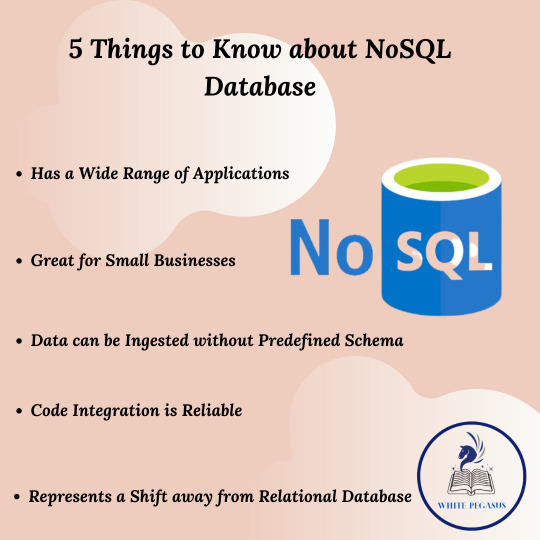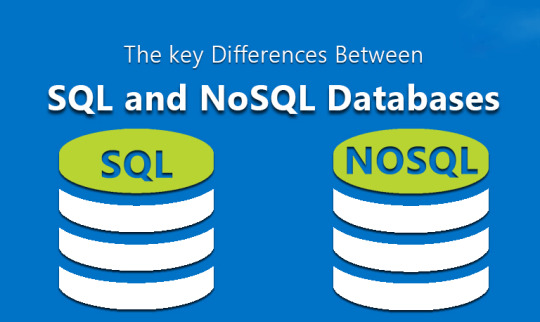#nosqldatabases
Explore tagged Tumblr posts
Text
🗂️📚 How to store and retrieve data from MongoDB? Master the techniques for efficient data management with MongoDB in modern applications.
1 note
·
View note
Text






#DidYouKnow NoSQL Databases Enable Big Data Handling
Swipe left to explore!
To learn more about NOSQL Database Management Click Here 👉 https://simplelogic-it.com/nosql-database-management/
💻 Explore insights on the latest in #technology on our Blog Page 👉 https://simplelogic-it.com/blogs/
🚀 Ready for your next career move? Check out our #careers page for exciting opportunities 👉 https://simplelogic-it.com/careers/
#didyouknowfacts#knowledgedrop#interestingfacts#factoftheday#learnsomethingneweveryday#mindblown#didyouknowthat#triviatime#learnsomethingnew#nosql#nosqldatabase#databse#data#unstructureddata#analytics#iot#scalable#application#makeitsimple#simplelogicit#simplelogic#makingitsimple#itservices#itconsulting
0 notes
Text
What is MongoDB? A Simple Explanation
Learn about MongoDB, a popular NoSQL database that stores data in flexible, JSON-like documents. Ideal for developers handling unstructured or changing data.
0 notes
Text
Cassandra To Spanner Proxy Adaptor Eases Yahoo’s Migration

Yahoo’s migration process is made easier with a new Cassandra to Spanner adapter.
A popular key-value NoSQL database for applications like caching, session management, and real-time analytics that demand quick data retrieval and storage is Cassandra. High performance and ease of maintenance are ensured by its straightforward key-value pair structure, particularly for huge datasets.
- Advertisement -
However, this simplicity also has drawbacks, such as inadequate support for sophisticated queries, the possibility of data repetition, and challenges when it comes to modeling complicated relationships. In order to position itself for classic Cassandra workloads, Spanner, Google Cloud’s always-on, globally consistent, and nearly infinite-scale database, blends the scalability and availability of NoSQL with the strong consistency and relational nature of traditional databases. With the release of the Cassandra to Spanner Proxy Adapter, an open-source solution allowing plug-and-play migrations of Cassandra workloads to Spanner without requiring modifications to the application logic, switching from Cassandra to Spanner is now simpler than ever.
Spanner for NoSQL workloads
Strong consistency, high availability, nearly infinite scalability, and a well-known relational data model with support for SQL and ACID transactions for data integrity are all features that Spanner offers. Being a fully managed service, it facilitates operational simplification and frees up teams to concentrate on developing applications rather than managing databases. Additionally, by reducing database downtime, Spanner’s high availability even on a vast global scale supports business continuity.
Spanner is always changing to satisfy the demands of contemporary companies. Improved multi-model capabilities including graph, full-text, and vector searches, higher analytical query performance with Spanner Data Boost, and special enterprise features like geo-partitioning and dual-region settings are some of the most recent Spanner capabilities. These potent features, together with Spanner’s alluring price-performance, provide up a world of fascinating new opportunities for Cassandra users.
Yahoo has put the Cassandra to Spanner adapter to the test
“Spanner sounds like a leap forward from Cassandra,” in case you were wondering. How can I begin? The proxy adapter offers a plug-and-play method for sending Cassandra Query Language (CQL) traffic from your client apps to Spanner. The adapter works as the application’s Cassandra client behind the scenes, but it communicates with Spanner internally for all data manipulation operations. The Cassandra to Spanner proxy adapter simply works without requiring you to migrate your application code!
Yahoo benefited from increased performance, scalability, consistency, and operational efficiency after successfully migrating from Cassandra to Spanner. Additionally, the proxy adapter made the migration process simple.
Reltio is another Google Cloud client that has made the switch from Cassandra to Spanner. Reltio gained the advantages of a fully managed, globally distributed, and highly consistent database while minimizing downtime and service disruption through an easy migration process.
These success examples show that companies looking to upgrade their data architecture, uncover new capabilities, and spur creativity may find that switching from Cassandra to Spanner is a game-changer.
How is your migration made easier by the new proxy adapter? The following procedures are involved in a typical database migration:Image credit to Google Cloud
Some of these stages are more complicated than others, such as moving your application (step 4) and moving the data (step 6). Migrating a Cassandra-backed application to point to Spanner is made much easier by the proxy adaptor. A high-level summary of the procedures needed to use the new proxy adapter is provided here:
Assessment: After switching to Spanner, determine which of your Cassandra schema, data model, and query patterns may be made simpler.
Schema design: The documentation thoroughly discusses the similarities and differences between Spanner’s and Cassandra’s table declaration syntax and data types. For optimum efficiency, you can additionally utilize relational features and capabilities with Spanner, such as interleaved tables.
Data migration: To move your data, follow these steps:
Bulk load: Utilizing programs like the Spanner Dataflow connector or BigQuery reverse ETL, export data from Cassandra and import it into Spanner.
Replicate incoming information: Use Cassandra’s Change Data Capture (CDC) to instantly replicate incoming updates to Spanner from your Cassandra cluster.
Updating your application logic to execute dual-writes to Cassandra and Spanner is an additional option. If you want to make as few modifications to your application code as possible, google Cloud do not advise using this method.
Update your Cassandra setup and set up the proxy adapter: The Cassandra to Spanner Proxy Adapter operates as a sidecar next to your application; download and start it. The proxy adapter uses port 9042 by default. Remember to modify your application code to point to the proxy adapter if you choose to use a different port.
Testing: To make sure everything functions as planned, thoroughly test your migrated application and data in a non-production setting.
Cutover: Move your application traffic to Spanner as soon as you are comfortable with the migration. Keep a watchful eye out for any problems and adjust performance as necessary.
What does the new proxy adapter’s internal components look like?
The application sees the new proxy adaptor as a Cassandra client. The Cassandra endpoint’s IP address or hostname has changed to point to the proxy adapter, which is the only discernible change from the application’s point of view. This simplifies the Spanner migration without necessitating significant changes to the application code.Image credit to Google Cloud
To provide a one-to-one mapping between every Cassandra cluster and its matching Spanner database, Google builds the proxy adapter. A multi-listener architecture is used by the proxy instance, and each listener is connected to a different port. This makes it possible to handle several client connections at once, with each listener controlling a separate connection to the designated Spanner database.
The complexities of the Cassandra protocol are managed by the translation layer of the proxy. This layer handles buffers and caches, decodes and encodes messages, and most importantly parses incoming CQL queries and converts them into counterparts that are compatible with Spanner.
To gather and export traces to Cloud Trace, the proxy adapter supports OpenTelemetry.
Taking care of common issues and difficulties
Let’s talk about some issues you might be having with your migrations:
Cost: Take a look at Accenture’s benchmark result, which shows that Spanner guarantees cost effectiveness in addition to consistent latency and throughput. To help you utilize all of Spanner’s features, the company has also introduced a new tiered pricing structure called “Spanner editions,” which offers improved cost transparency and cost-saving options.
Latency increases: When executing the proxy adapter in a Docker container, Google advises running it on the same host as the client application (as a side-car proxy) or on the same Docker network to reduce an increase in query latencies. Additionally, Google advised limiting the proxy adapter host’s CPU usage to less than 80%.
Design flexibility: Spanner’s more rigid relational design gives benefits in terms of data integrity, query capability, and consistency, but Cassandra offers more flexibility.
Learning curve: There are some distinctions between Cassandra’s and Spanner’s data types. Examine this thorough material to help with the transition.
Start now
For companies wishing to take advantage of the cloud’s full potential for NoSQL workloads, Spanner is an appealing choice due to its robust consistency, streamlined operations, improved data integrity, and worldwide scalability. Google Cloud is making it simpler to plan and implement your migration strategy with the new Cassandra to Spanner proxy adapter, allowing your company to enter a new era of data-driven innovation.
Read more on govindhtech.com
#Cassandra#SpannerProxyAdaptor#NoSQLdatabase#EasesYahooMigration#Spanner#OpenTelemetry#newproxyadapter#internalcomponents#news#NoSQLworkloads#technology#technews#govindhtech
0 notes
Text
Elevate Your Data Skills with SQL: A Beginner’s Path to Success
Imagine running a business with no clue which products are selling the most or having a customer list with no knowledge of buying behavior. Without organized data, organizations risk making blind decisions, which can lead to lost earnings. That is where SQL comes into play. It provides professionals with the ability to sort, analyse, and extract data efficiently. So, if you are looking for an SQL Course With Certificate, now is the ideal time to learn this skill and be competitive in the data-driven economy.

What is SQL?
In simple terms, SQL (Structured Query Language) is the language we use while handling databases. Think of a database as a giant, highly organized filing cabinet with a huge quantity of information on different types. SQL is the language with which you can find a specific file, update it, add new files, or maybe reorganize the cabinet itself. It is the language for data, regardless of which database program you're using.
So, what makes SQL so important? Well, in the data-driven world of today, the ability to extract valuable information from raw data is critical. Whether you're analyzing sales trends to boost earnings, understanding customer behavior to create better products, or monitoring inventory to improve efficiency, SQL empowers you to make data-driven decisions supported by solid facts.
Understanding NoSQL: The Alternative to SQL DatabasesWhile SQL has been ruling data management for so long, a new approach, known as NoSQL, came along to answer the call of today's big data. NoSQL, or Not Only SQL, is a term for a group of database technologies used to interact with unstructured or semi-structured data that cannot be easily adjusted in the relational tables of traditional databases.
Key Distinctions Between SQL and NoSQLDatabase Structure: SQL databases follow a relational structure with data split into tables with columns and rows. While different architectures are followed by NoSQL databases, including document, key-value, and graph, each suited for specific data types and applications.
Database Schema and Query Languages: SQL databases maintain a strict schema in which data must stick to a predefined structure. SQL language is utilized for querying, which offers an extensive range of data manipulation and analytical functions. Dynamic or schema-less designs are characteristic of the NoSQL databases, which can support more versatile data storage.
Database Scaling: SQL databases scale vertically by increasing the resources (memory, CPU, storage) of one server. NoSQL databases scale horizontally by distributing data between many servers in a group. Horizontal scaling provides greater capacity than vertical scaling, hence making NoSQL databases a reason to fit for big and dynamically changing data sets.
Data Structure: SQL databases store data in tabular structures with columns and rows. This is helpful while performing multiple data transformations. The data structures supported by the NoSQL databases vary, including document to key-value pairs, graphs, and column families.
Use Cases: SQL databases are suited for applications with strict consistency and complex data relationships, such as financial systems, e-commerce websites, and CRM systems. NoSQL databases are suited for applications with high performance, flexibility, and scalability with unstructured or semi-structured data, such as social media websites, IoT and applications.
Getting Started With UniAthena’s SQL Beginner Course This SQL Certification Course with Certificate provides you with the foundational concepts, including fields and records, right up to the essential principles of RDBMS and DBMS. The course combines theory with hands-on application so that you can confidently use SQL to work with databases and effectively use various SQL elements for data handling and manipulation. Further, the basic concepts such as SQL constraints, aggregate functions, and various types of Joins, allow you to relate and work with data in meaningful ways.
Best of all? The course is delivered in a clear, concise, and to-the-point manner that lets you learn at your own speed and complete it in just 1-2 weeks of learning. And upon completion, you'll have the chance to earn a Blockchain-verified certification, which gives your SQL abilities an added credibility for future employers. Are you prepared to take your career to the next level with the power of data? Enroll for this SQL Course with Certificate and be a data-driven decision-maker.
0 notes
Text
Creating User in MongoDB Database |Starting MongoDB server with Authentication
youtube
MongoDB is a database system that allows users to create and manage roles for different users with specific roles. To create an account, users can use the command DB dot, which requires users to join a class info database and then run a command to list all the databases existing in the database. Password is a field that requires registration, and users can create a password. Sunil users can give users the username and password associated with the account. The most important details in this text are the roles assigned to a user by a mongodb, the assignment of roles and responsibilities to the user, and the creation of a database with a username, password, and list of roles.
#edudreams#nosql#nosqldatabases#developers#developer#programming#programmers#development#coding#dotnet#csharp#Youtube
1 note
·
View note
Text
Creating User in MongoDB Database |Starting MongoDB server with Authentication
youtube
MongoDB is a database system that allows users to create and manage roles for different users with specific roles. To create an account, users can use the command DB dot, which requires users to join a class info database and then run a command to list all the databases existing in the database. Password is a field that requires registration, and users can create a password. Sunil users can give users the username and password associated with the account. The most important details in this text are the roles assigned to a user by a mongodb, the assignment of roles and responsibilities to the user, and the creation of a database with a username, password, and list of roles.
#edudreams#nosql#nosqldatabases#developers#developer#programming#programmers#development#fullstackdeveloper#coding#Youtube
0 notes
Text
Install Elasticsearch in Ubuntu 20.04
Elasticsearch is a distributed, open-source search and analytics engine for all types of data, including textual, numerical, geospatial, structured, and unstructured. Elasticsearch is fast, distributed by nature. Here you can find steps to install elasticsearch.
https://theaidigest.in/install-elasticsearch-in-ubuntu-20-04/
#elasticsearch#loganalytics#kibana#nosql#nosqldatabase#searchengine#searchengineranking#datascience#machine learning#ai
1 note
·
View note
Text

Types of Databases . . . . for more information http://bit.ly/3Zf0cxI check the above link
#data#database#dbms#rdbms#typesofdbms#computer#computerscienece#Centralized#DistributedDatabase#RelationalDatabase#NoSQLDatabase#CloudDatabase#ObjectOrientedDatabases#HierarchicalDatabases#NetworkDatabases#PersonalDatabase#OperationalDatabase#EnterpriseDatabase#javatpoint
0 notes
Photo

Learn MongoDB Leading NoSQL Database from scratch for beginner Learn MongoDB Leading NoSQL Database from scratch for beginner in simple and easy steps using this beginner's tutorial containing basic to advanced knowledge #mongoose #mongodb #mongodbatlas #nosql #nosqldatabase #nosqlnow #tutorial #mongodbtutorial #mongodbtutorials #mongodbdevelopment #mongodbquickstart (at Sindhuvalli) https://www.instagram.com/p/CV-QmMYvbeB/?utm_medium=tumblr
#mongoose#mongodb#mongodbatlas#nosql#nosqldatabase#nosqlnow#tutorial#mongodbtutorial#mongodbtutorials#mongodbdevelopment#mongodbquickstart
0 notes
Photo

5 Things to Know about NoSQL Database
• Has a Wide Range of Applications • Great for Small Businesses • Data can be Ingested without Predefined Schema • Code Integration is Reliable • Represents a Shift away from Relational Database
Learn More
0 notes
Photo

Follow 👉 @learn.eternally for more custom content Difference between SQL and NoSQL👈 Follow 👉@learn.eternally Follow 👉@learn.eternally #sqldeveloper #sqlinjection #sqlite #sqlserver #nosql #nosqldatabase #sqlserver2016 #computerengineering #computersciencestudent #computerworld #developerstudentclubs #developerstuff #developpement (at Lucknow, Uttar Pradesh) https://www.instagram.com/p/CCvlqe2H5jO/?igshid=12i8m1xqrp4ks
#sqldeveloper#sqlinjection#sqlite#sqlserver#nosql#nosqldatabase#sqlserver2016#computerengineering#computersciencestudent#computerworld#developerstudentclubs#developerstuff#developpement
0 notes
Text
Scalable & Flexible NOSQL Database Management 📊 Seamless Integration 🔗 Easily integrate with modern applications and big data systems High Availability 🌐 Ensure your data is accessible 24/7 with distributed systems Real-Time Data Processing ⏱️ Handle unstructured data with real-time processing capabilities Optimized for Big Data 📈 Perfect for IoT, social media, and large-scale apps Unlock the Potential of NOSQL Databases Today 📧 Email: [email protected] 📞 Phone: +91 86556 16540
#NOSQL#Database#NOSQLDatabase#Integration#RealTimeData#UnstructuredData#BigData#IoT#Applications#SimpleLogicIT#MakingITSimple#MakeITSimple#SimpleLogic
0 notes
Photo

SQL Database is a relational yet conventional database and a structured one that uses a tabular relational model to represent data and their relationship. The NoSQL database is the new yet Non-relational database that provides a mechanism for storage and retrieval of data other than the model of the tabular relation used in relational databases.
Read more: https://edu.varistor.in/sql-vs-nosql/
0 notes
Link
👉 Welcome to the Video Series on Interesting topics of Modern Python Programming Language. In this video, I've talked about the following aspects of Object Oriented Python 👉 What's are Classes and Objects? 👉 Defining Constructor using __init__ function 👉 Instance Variables and Instance methods 👉 Class variables and class methods ☑️ Hope it helps you to understand as well as to start with the basics of Object Oriented Python
#python#python programming#data science#machine learning#data analytics#ai#artificial intelligence#code#coding#database#nosqldatabase
0 notes
Photo

They say #information is power and information is the truth from the data. Whether it be #r #python #sas #tensorflow #pandaspython #apachespark #sql #excel teasing the truth from the data is increasingly salable and valuable. I've heard that applying #algebraictopology with #nosql #nosqldatabase and #quantumcomputing releases the truth from the data #informationtheory. What do you think? What did I miss?? Dimensions are spatial, and analysis in n-dimensions can therefore be understood in terms of n-dimensional geometry? 😲#wtf #dimensionreductionality #artificialintelligence #businessintelligence #datascience #dataanalytics #analytics https://www.instagram.com/p/B6kPFliH-uo/?igshid=1grvp8dua4xej
#information#r#python#sas#tensorflow#pandaspython#apachespark#sql#excel#algebraictopology#nosql#nosqldatabase#quantumcomputing#informationtheory#wtf#dimensionreductionality#artificialintelligence#businessintelligence#datascience#dataanalytics#analytics
0 notes